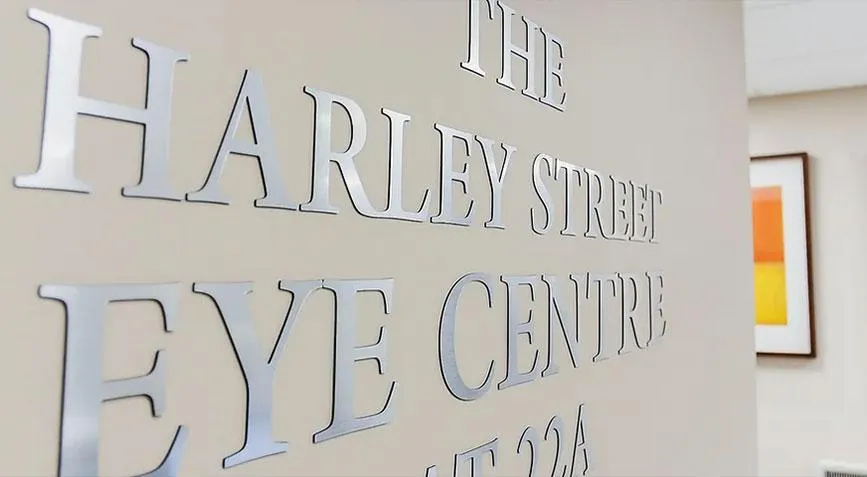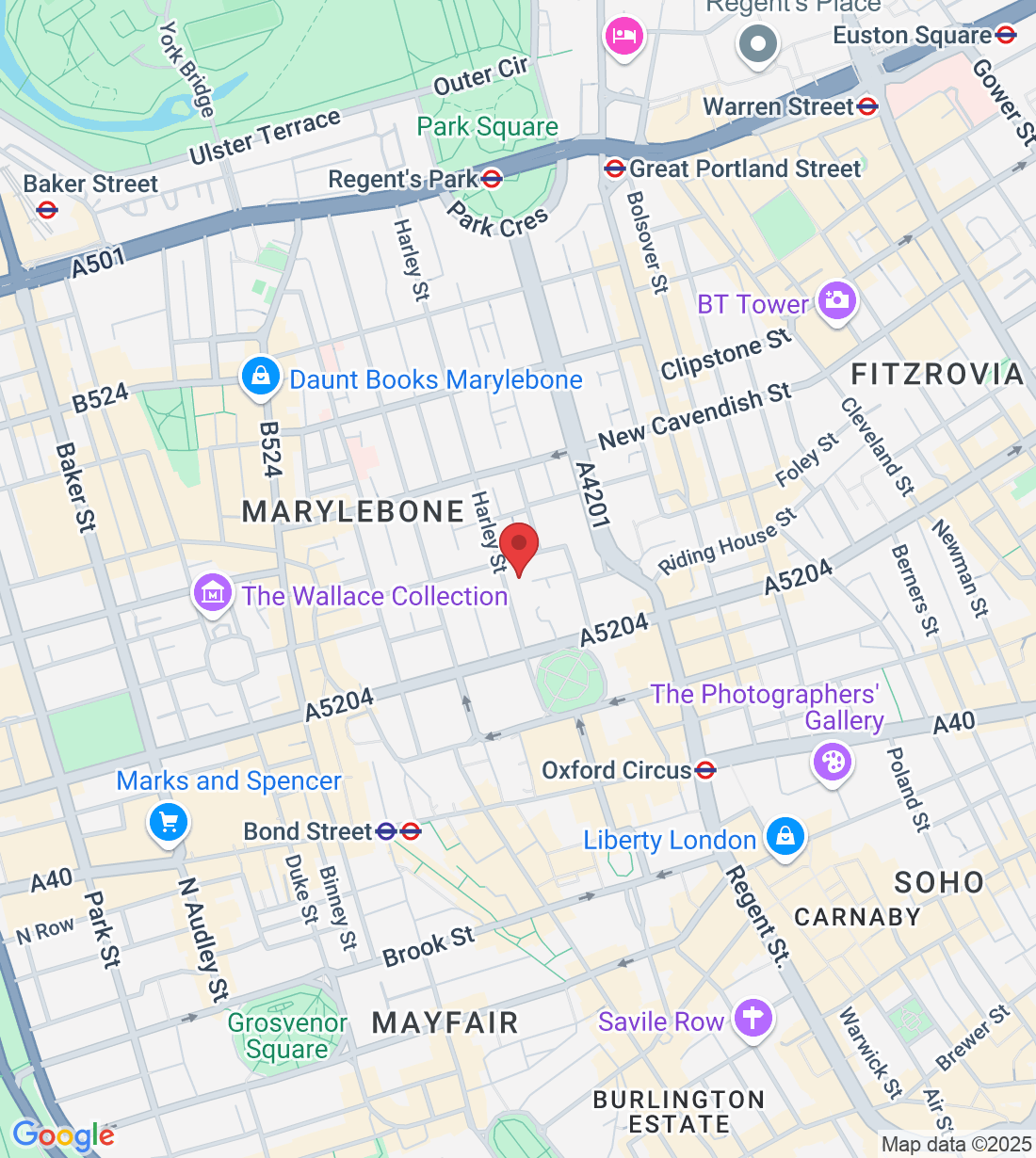
Cataract Surgery at The Harley Street Eye Centre London
Cataract surgery at the Harley Street Eye Centre in London offers advanced and effective treatment for cataracts, a common eye condition.
Led by experienced ophthalmologists, the centre provides state-of-the-art surgical procedures to remove cataracts and restore clear vision

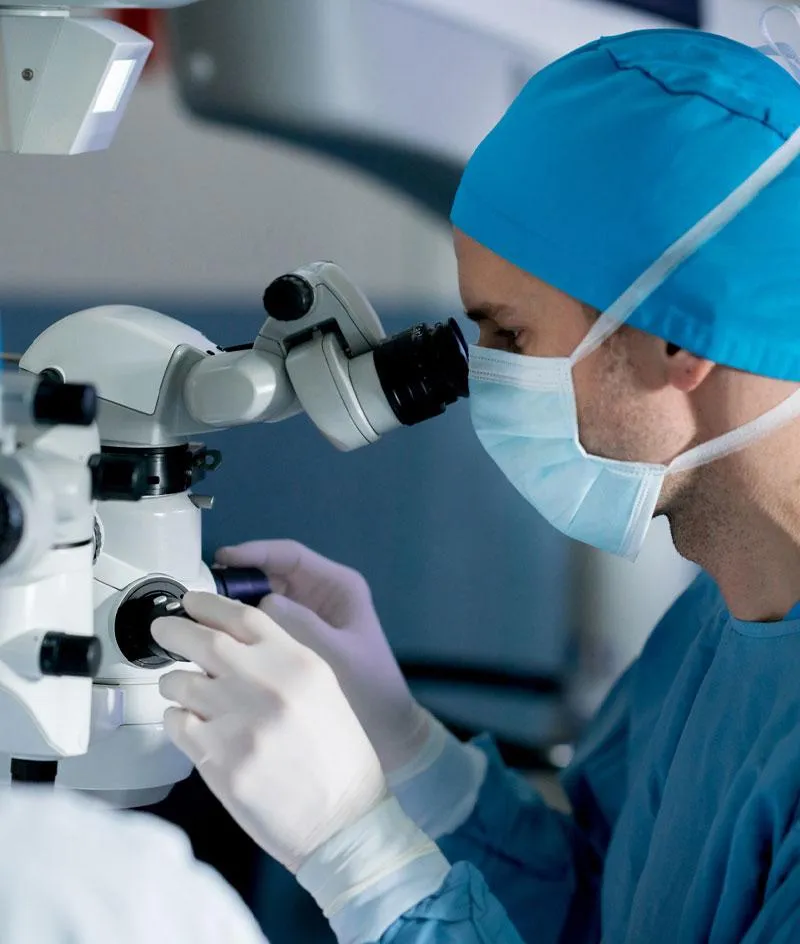
SINCE 2019, OUR EYE CLINIC HAS TREATED OVER 4,700 PATIENTS WITH ADVANCED EYE CARE.

Download Your FREE Cataract Surgery Information Pack:
“Cataract Surgery... Everything You Need To Know Before Considering Surgery”
Click the button below to get your FREE information pack
*Downloaded over 2500+ times
Does any of this sound like YOU?
Your vision has become increasingly hazy or foggy, making it difficult to see clearly?
You're finding it difficult to see clearly in low-light conditions, making it harder to drive or navigate in dimly lit areas?
You're more sensitive to bright lights, causing discomfort or difficulty in situations with bright sunlight, oncoming headlights, or glare from lamps?
You perceive colours to be appear duller, faded, or yellowish than they are?
You find yourself requiring brighter light than before to read or perform tasks?
You experience double vision in one eye or both, leading to overlapping or ghost-like images?
You often notice that your prescription for glasses needs to be updated frequently?
You're finding it difficult to perform everyday tasks, such as reading, driving, watching TV, or even recognising faces?

Mr Marwan Ghabra
Clinical Director
It is important to note that these signs are not definitive indicators of cataracts or the need for surgery. After a thorough eye examination and the appropriate diagnostic tests, a qualified eye care professional at The Harley Street Eye Centre can determine a proper diagnosis and treatment plan, if required.
Cataract Surgery & Treatments at a Glance
Cataract surgery is a safe and effective procedure designed to treat cataracts, a common age-related eye condition that causes the lens of the eye to become cloudy, leading to blurred vision and visual impairment. This surgery involves the removal of the cloudy lens and its replacement with an artificial intraocular lens (IOL), restoring clear vision and improving quality of life.
Here's a quick overview of cataract surgery and other treatment options:
Phacoemulsification: This is the most common technique used in cataract surgery. It involves using ultrasound energy to break up the cloudy lens into tiny fragments, which are then gently removed through a small incision. The IOL is then inserted into the eye, replacing the natural lens.
Laser-assisted cataract surgery: In some cases, a laser may be used to perform certain steps of the surgery, such as creating precise incisions and softening the cataract for easier removal. This advanced technique can enhance the precision and safety of the procedure.
Premium IOLs: In addition to standard IOLs, there are premium IOLs available that can correct other vision problems such as astigmatism or presbyopia. These specialised lenses can reduce or eliminate the need for glasses or contact lenses after cataract surgery.
Monovision: For individuals who wish to reduce their dependence on glasses or contact lenses for near vision, monovision can be achieved by implanting different types of IOLs in each eye, one optimized for distance vision and the other for near vision.
Refractive lens exchange (RLE): This procedure is similar to cataract surgery but is performed in patients without significant cataracts. It involves removing the clear natural lens and replacing it with an IOL to correct refractive errors, such as nearsightedness or farsightedness.

Got a Question?
Ask Mr Ghabra & His Team Of Doctors
What is Cataract Surgery?
Cataracts occur when the normally clear lens inside your eye becomes clouded and opaque, resulting in vision problems. The cloudiness of a cataract is caused by the hardening of liquid proteins in the lens, similar to the transformation of a clear liquid into an opaque solid when an egg is cooked.
This cloudiness prevents light from passing through the eye properly, leading to visual impairment.
Cataracts can affect your vision in two ways:
Impaired light transmission: The clouded lens hinders the passage of light, resulting in blurry or dim vision.
Altered focusing ability: The natural lens is responsible for automatically adjusting its shape to focus on near objects.
Cataracts typically develop slowly over time, and you may not realise you have them until they start affecting your vision.
Common symptoms include:
Blurry vision that is not corrected by glasses
Difficulty driving at night due to reduced visual clarity
Seeing multiple images or experiencing double vision in one eye
Increased sensitivity to glare from lights

Download Your FREE Cataract Surgery Information Pack:
“Cataract Surgery... Everything You Need To Know Before Considering Surgery”
Click the button below to get your FREE information pack
*Downloaded over 2500+ times
Types of Cataracts
There are several types of cataracts, but the most common form is age-related cataracts, which typically develop in individuals aged 50 and above. Age-related cataracts occur as a result of the natural aging process and the gradual deterioration of the proteins in the lens of the eye. As these proteins break down and clump together, the lens becomes cloudy, impairing vision.
It's worth noting that while age-related cataracts are the most prevalent, cataracts can also occur due to other factors, including:
Congenital cataracts: Some individuals are born with cataracts or develop them shortly after birth. These cataracts may be caused by genetic factors, infections during pregnancy, or other developmental issues.
Traumatic cataracts: Cataracts can develop as a result of an eye injury or trauma, such as being hit in the eye or experiencing a penetrating eye injury. These cataracts may develop immediately after the trauma or take time to manifest.
Secondary cataracts: Certain medical conditions, such as diabetes, prolonged use of corticosteroid medications, or exposure to radiation, can increase the risk of developing cataracts. These are referred to as secondary cataracts.
Different Lenses to Suit Your Lifestyle
At our cataract surgery center, we understand the importance of personalized care and tailoring the treatment to meet your specific needs. One key aspect of the cataract surgery process is selecting the most suitable intraocular lens (IOL) to be implanted during the procedure. The choice of IOL will depend on several factors, including your eligibility, lifestyle, and the presence of astigmatism.
During your initial assessment with our experienced cataract surgeon, we prioritize open and thorough communication to understand your unique requirements. We will discuss your visual goals, lifestyle demands, and any pre-existing astigmatism to guide the selection of the appropriate lens for you.
Here are some types of IOLs that we may consider:
Monofocal Lenses
Toric Lenses
Monovision Lenses
Multifocal Lens
Frustrated With Your Eyes? Still Feeling Confused & Not Sure What Do Next?
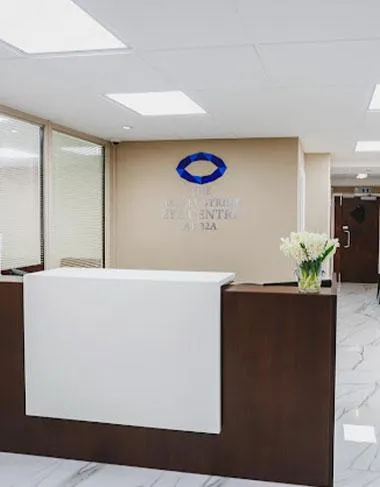
One of our Doctors will call you for FREE and answer any questions or concerns you may have.
Fill in the form to request a call from one of our Doctors
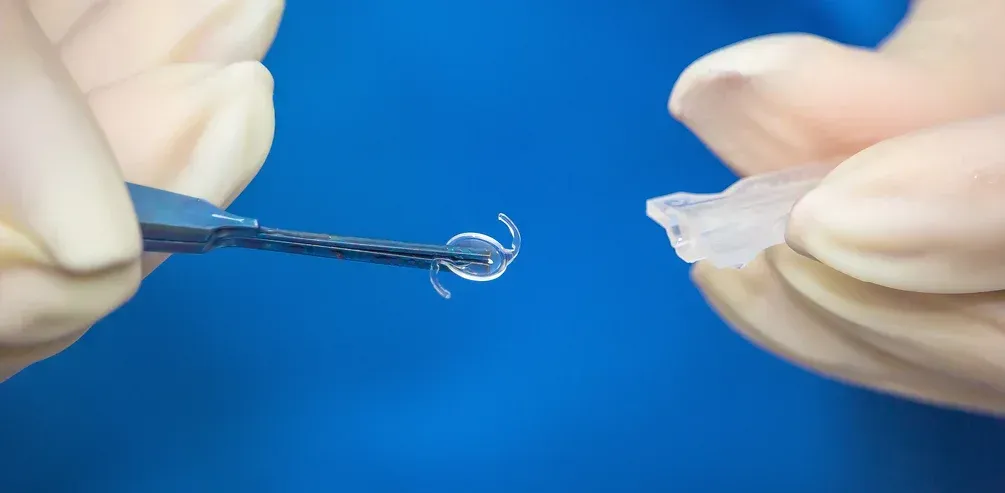
Monofocal Lenses
These lenses provide excellent vision at a single focal point, typically for distance vision. They are an ideal choice if you desire clear distance vision without the need for glasses, but you may still require glasses for near tasks.
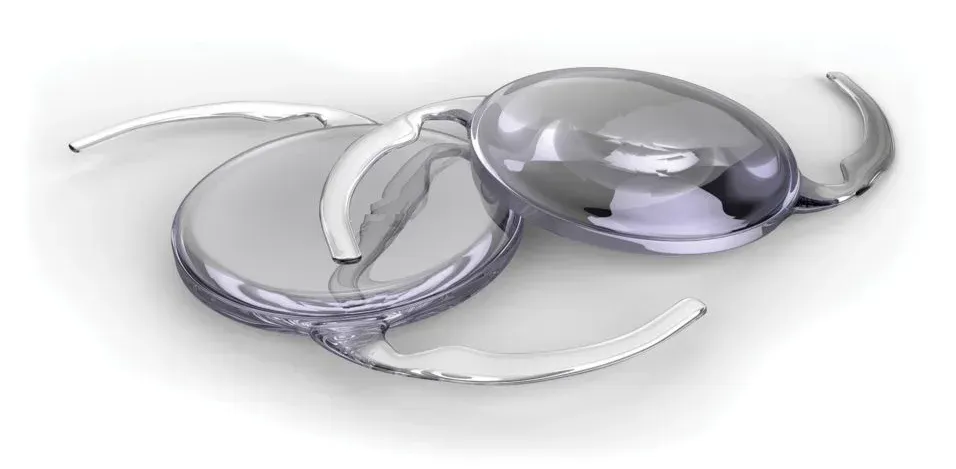
Toric Lenses
If you have significant astigmatism, toric IOLs can correct both cataracts and astigmatism simultaneously. These specialised lenses have additional cylindrical power to address astigmatism, allowing for improved clarity at various distances.

Monovision Lenses
Monovision lenses are used to reduce reliance on glasses or contact lenses for near vision after cataract surgery. By implanting different intraocular lenses (IOLs) in each eye, one optimised for distance vision and the other for near vision, individuals can achieve improved visual flexibility and potentially minimise the need for reading glasses or bifocals.
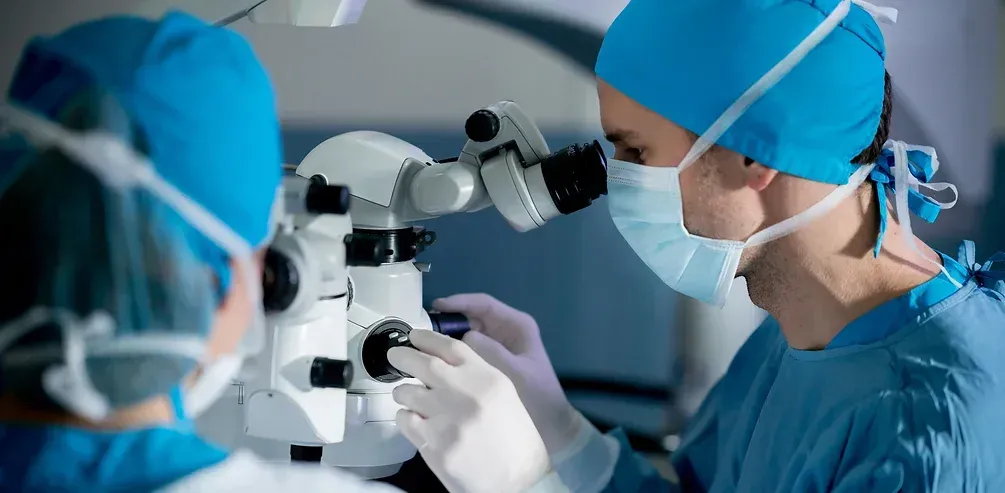
Multifocal Lenses
These advanced lenses offer multiple focal points, enabling good vision at various distances, including near, intermediate, and distance vision. They reduce dependence on glasses for most activities and provide a broader range of clear vision.
Refractive Lens Exchange
Refractive lens exchange (RLE) is for those patients whom haven’t quite developed a cataract but are feeling the effects of presbyopia (the need for reading glasses to counter the effect of loss of focus on near objects, due to the effect of aging on the eye. This tends to start around the age of 45-50).
In much the same way as a traditional cataract surgery, your natural lens is broken up and replaced with any of the lenses mentioned above. The Multifocal and monovision lenses will assist you with clear vision for both near, intermediate and distance objects mimicking the effect of your natural lens.

Got a Question?
Ask Mr Ghabra & His Team Of Doctors

Your Surgical Journey
Your surgical journey starts with a consultation with an ophthalmic consultant / cataract surgeon. During your time with your doctor, information will be collected about your past medical history, onset of symptoms and so on. A meticulous examination will be performed followed by investigations.
All lens options available will require at least 1 scan (all available in-house at The Harley Street Eye Centre).
Patients can op-out of having an aberrometry scan (I-trace) however we recommend that this is performed. With only 1 of 3 available in London, the aberrometer allows you to directly observe what your vision will be after surgery, without any surprises falling short of expectations.
Once the information is gathered you and your consultant will choose the most appropriate lens that suits your lifestyle needs, each eye is different and each patient is different and therefore choosing the correct lens is vital.

Download Your FREE Cataract Surgery Information Pack:
“Cataract Surgery... Everything You Need To Know Before Considering Surgery”
Click the button below to get your FREE information pack
*Downloaded over 2500+ times
The Day of Your Cataract Operation
When you arrive at The Harley Street Eye Centre, our friendly reception staff will assist you with the check-in process. Once settled, a dedicated member of our experienced medical team will guide you through important safety checklists to ensure your well-being throughout the surgical journey.
Prior to the procedure, eye drops will be applied to prepare your eyes for surgery. These drops help to dilate the pupils and provide anesthesia to ensure your comfort during the procedure. Once you are ready, you will be escorted to the surgical suite where you will meet your skilled surgeon.
In the surgical suite, your surgeon will greet you and ensure that you are comfortable and informed about the upcoming procedure. They will review the surgical plan and address any last-minute concerns or questions you may have. Our team is committed to providing a supportive and calming environment, ensuring that you feel at ease before the surgery begins.
At The Harley Street Eye Centre, we prioritize patient care and safety, and our dedicated team will be with you every step of the way to ensure a seamless and successful cataract surgery experience.
Frustrated With Your Eyes? Still Feeling Confused & Not Sure What Do Next?

One of our Doctors will call you for FREE and answer any questions or concerns you may have.
Fill in the form to request a call from one of our Doctors
How Long Will The Surgery Take?
Cataract removal is a relatively quick and efficient procedure, typically lasting around 15 to 20 minutes. To access the clouded lens, a small incision is made in the side of the cornea, the clear front surface of the eye. This incision is carefully created to ensure optimal surgical outcomes and minimal disruption to the surrounding tissues.
Once the surgeon has gained access to the lens, specialized techniques such as phacoemulsification are employed. This involves using ultrasound energy to break up the cataract into small fragments, which are then gently suctioned out of the eye. The phacoemulsification process is designed to minimize trauma to the eye and allow for a smoother and quicker recovery.
Once the cataract has been completely removed, the surgeon will insert a new artificial lens, known as an intraocular lens (IOL), into the same incision. The IOL is precisely chosen based on your individual needs and desired visual outcomes. It is carefully positioned within the eye to replace the natural lens, providing improved clarity of vision.
The incision in the cornea is typically self-sealing, eliminating the need for stitches in most cases. This promotes faster healing and reduces the risk of complications. The surgeon may use gentle irrigation to ensure the eye is clear of any debris before concluding the procedure.
Throughout the entire process, your surgeon and the medical team will prioritize your comfort and safety. Close attention is paid to maintaining sterile conditions and monitoring your well-being. After the procedure, you will receive post-operative instructions and guidance to facilitate a smooth recovery and maximise the benefits of the cataract surgery.

Got a Question?
Ask Mr Ghabra & His Team Of Doctors
What Happens After The Surgery?
After the cataract surgery procedure, several important steps are taken to ensure your well-being and provide you with necessary post-operative care.
Once the surgery is completed, post-operative checks are conducted by our skilled medical team. These checks involve assessing your eye's condition, checking intraocular pressure, and ensuring that there are no immediate complications or discomfort.
Following the post-operative checks, a short observation period allows our medical professionals to monitor your initial recovery. During this time, you will be provided with instructions and guidance to support your healing process. Your consultant, the surgeon overseeing your procedure, will meet with you to review your post-operative progress and discuss any immediate concerns or questions you may have. They will also provide you with a written explanation of what to expect during the initial 48 hours following surgery.
In addition to the instructions, you will be given specific eye drops that aid in the healing process and promote optimal recovery. These drops are important in preventing infection, reducing inflammation, and ensuring the best possible outcome.
To monitor your ongoing recovery, a follow-up appointment will be scheduled within the initial 48-hour period. This follow-up appointment allows your surgeon to evaluate your progress, assess the effectiveness of the surgery, and address any further questions or concerns you may have.
At The Harley Street Eye Centre, we are committed to providing comprehensive care throughout your cataract surgery journey. Our post-operative procedures and follow-up appointments ensure that you receive the necessary support, monitoring, and guidance to achieve a successful recovery and the best possible visual outcomes.

Just 8 Reasons To Choose The Harley Street Eye Centre
Expertise and Experience: - The Harley Street Eye Centre boasts a team of highly skilled and experienced eye specialists who are renowned in their respective fields. They have the knowledge and expertise to provide top-quality eye care and treatment.
State-of-the-Art Facilities: - The clinic is equipped with advanced and cutting-edge technology, ensuring that patients receive the most accurate diagnoses and effective treatments available in the field of ophthalmology.
Comprehensive Eye Care - The Harley Street Eye Centre offers a wide range of eye care services, including routine eye exams, refractive surgery (such as LASIK), cataract surgery, corneal transplants, glaucoma treatment, and more. Patients can receive comprehensive eye care under one roof.
Personalised Treatment Plans - Each patient is unique, and at The Harley Street Eye Centre, the treatment plans are tailored to meet individual needs. The doctors take the time to understand the specific concerns of each patient and develop personalised treatment strategies accordingly.
Strong Reputation - The Harley Street Eye Centre has built a strong reputation over the years due to its commitment to excellence. The clinic has a track record of successful treatments and satisfied patients, which is reflected in positive reviews and testimonials.
Commitment to Excellence - The Harley Street Eye Centre has built a strong reputation over the years due to its commitment to excellence. The clinic has a track record of successful treatments and satisfied patients, which is reflected in positive reviews and testimonials.
Collaborative Approach - The Harley Street Eye Centre is dedicated to providing the highest standard of eye care and treatment. They prioritise patient safety, satisfaction, and long-term visual health, making them a trusted choice for individuals seeking the best eye clinic for their needs.
Continuing Education and Research - The team at The Harley Street Eye Centre remains at the forefront of advancements in ophthalmology through continuous education and involvement in research. This commitment to staying updated with the latest developments ensures that patients receive the best available treatments.
Commonly Asked Questions About Cataract Surgery & Treatments
What is a cataract?
A cataract refers to the clouding of the natural lens inside the eye, leading to blurry or hazy vision. It commonly occurs with age but can also result from factors such as injury, certain medications, or underlying medical conditions.
How is a cataract diagnosed?
A comprehensive eye examination by an ophthalmologist is necessary for an accurate diagnosis. The examination may involve visual acuity tests, dilated eye examination, and various diagnostic tests, such as tonometry to measure eye pressure and biometry to assess the size and shape of the eye.
Can cataracts be treated without surgery?
In the early stages, changes in eyeglass prescriptions or modifications in lighting conditions may temporarily improve vision. However, cataracts progressively worsen, and surgery is the only effective treatment option to restore clear vision.
What does cataract surgery involve?
Cataract surgery involves removing the cloudy natural lens and replacing it with an artificial intraocular lens (IOL). The procedure is typically performed on an outpatient basis under local anesthesia, and it usually takes about 15-30 minutes to complete.
Is cataract surgery safe?
Cataract surgery is considered one of the safest and most commonly performed surgeries worldwide. It has a high success rate, with minimal complications. However, as with any surgical procedure, risks and potential complications exist, which will be thoroughly discussed by your ophthalmologist.
How long does it take to recover from cataract surgery?
The recovery time after cataract surgery is relatively short. Most patients experience improved vision within a few days, with complete recovery typically occurring within four to six weeks. Your ophthalmologist will provide specific post-operative care instructions to promote healing and optimal visual outcomes.
Will I need glasses after cataract surgery?
The choice of intraocular lens (IOL) can influence your need for glasses after cataract surgery. There are different types of IOLs available, including monofocal, multifocal, and toric lenses. Monofocal lenses typically provide clear vision at a fixed distance, while multifocal or toric lenses may reduce dependence on glasses for various distances. Your ophthalmologist will help you choose the most suitable IOL based on your visual needs and lifestyle.
Is cataract surgery covered by insurance?
Cataract surgery is generally covered by medical insurance plans. However, coverage details may vary, and it is advisable to consult with your insurance provider to understand the extent of coverage and any out-of-pocket expenses.
Are there any restrictions or precautions after cataract surgery?
After cataract surgery, it is important to avoid strenuous activities, swimming, or rubbing the eyes for a few weeks. Your ophthalmologist will provide detailed post-operative instructions tailored to your specific case to ensure a smooth recovery and minimise any potential complications.
What are the potential risks or complications of cataract surgery?
While cataract surgery is generally safe, there are potential risks and complications, albeit rare. These can include infection, bleeding, swelling, retinal detachment, increased intraocular pressure, or dissatisfaction with visual outcomes. Your ophthalmologist will discuss these risks with you and address any concerns you may have.
Please note that these FAQs are for informational purposes only and should not replace professional medical advice. It is essential to consult with a qualified eye care professional to receive an accurate diagnosis and appropriate treatment recommendations for your specific condition.

Download Your FREE Cataract Information Pack:
“Cataract Surgery... Everything You Need To Know Before Considering Surgery”
Click the button below to get your FREE information pack
*Downloaded over 2500+ times
About Harley Street Eye Centre
Located in the heart of Harley Street in London, The Harley Street Eye Centre continues the decades-old association of eye care with 22a Harley Street. This brand new state of the art clinic offers full and comprehensive ophthalmic treatment and imaging. Medical Lead Mr. Marwan Ghabra and his team of leading ophthalmic surgeons and dedicated professionals are committed to providing world-class eye care.
The Harley Street Eye Centre provides the right eye treatment at the right time. Your eyes are precious, and you should take great care of them.
Centre for Complicated Cases
The Harley Street Eye Centre, in addition to providing high-quality eye care locally
in the UK, is quickly becoming well known internationally as a go-to centre for complicated cases needing out of the box thinking with a strong base in currently accepted ophthalmic practice.
When it comes to a routine eye test, a problem with squinting, double vision, loss of vision, a sore eye or unbearable eye pain or complex serious trauma to the eye, our team of experts are best suited to advise, examine and treat your eyes to bring you, improved eye health and peace of mind.

Located in The Heart of Harley Street London, UK
Here at The Harley Street Eye Centre, we have the knowledge and expertise to treat your eyes.
Questions you might be asking asking: where is there an eye specialist near me? Which eye clinic offers the best vision care in London? We're right here.
Located in the heart of Harley Street, near Marylebone in London we have undoubtedly the best solutions backed up by our team of medical experts. A consultation with one of our eye doctors will be your first step towards achieving the best possible outcome for your eyes.
We are not just a clinic, but a technologically advanced eye care facility filled with experts who collectively have decades of experience. A leading Eye Care provider in Harley Street, London, our experienced team of ophthalmologists, opticians and experts will find the best possible solutions all in one place.
The Harley Street Eye Centre continues the decades-old association of eye care with 22a Harley Street. Our brand new state of the art clinic offers full and comprehensive ophthalmic treatment and imaging using the latest technology.
Medical Lead Mr. Marwan Ghabra and his team of leading ophthalmic surgeons and dedicated professionals are committed to providing world-class eye care.

What We Treat
The Harley Street Eye Centre offers a comprehensive range of eye care services, catering to various eye health needs. From routine eye exams to advanced procedures such as refractive surgery (e.g., LASIK), cataract surgery, corneal transplants, and glaucoma treatment.

Corneal Treatment and Surgery
Keratoconus
Cataract Surgery
Lasik Laser Eye Surgery
Pediatric Eye Treatments and Surgery

TransPRK Laser Eye Surgery
Cosmetic Eye Surgery
Dry Eye Treatments
Retinal Surgery and Treatments
Glaucoma Eye Surgery and Treatments
From Consultation to Treatment
What To Expect At Your First Visit With Us
We're excited to see you at your appointment! We want to make sure you feel comfortable and well-informed, so don't hesitate to ask us any questions about our treatments, our office, or even our payment options. Our goal is to help you get back to living your life free of visual impairment, so let's work together to make that happen!
Discuss your eye health goals
Full eye examination
Vision check and treatment eligibility
Diagnostic scans if required
Start a custom treatment plan
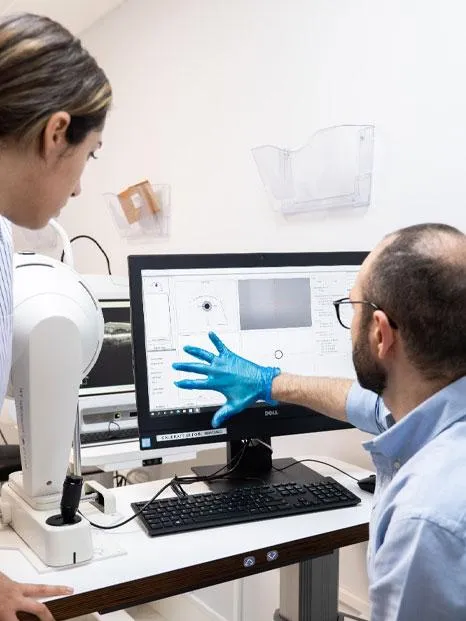

"Highly recommend The Harley Street Eye Centre. The team are professional, experienced and educated."
- Subé W
The reviews showcased are authentic feedback from patients who have received treatment at The Harley Street Eye Centre. While individual outcomes may differ, these reviews do not claim to reflect the results of all patients.
Frustrated With Your Eyes? Still Feeling Confused & Not Sure What Do Next?

One of our Doctors will call you for FREE and answer any questions or concerns you may have.
Fill in the form to request a call from one of our Doctors
© Copyright 2023. The Harley Street Eye Centre. All rights reserved.


